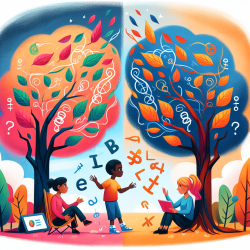Introduction
As practitioners in the field of speech language pathology, we are constantly seeking ways to enhance the health and well-being of children. A recent study, "Assessing the links between human rights and global tobacco control through statements made on global fora," highlights a critical intersection between human rights and tobacco control that can significantly impact child health outcomes. This blog post will explore how integrating human rights into tobacco control can lead to improved health outcomes for children and encourage practitioners to consider these findings in their work.
The Intersection of Human Rights and Tobacco Control
The study conducted by Sircar and Bialous (2021) emphasizes the emerging role of human rights in framing global health governance, particularly in the context of tobacco control. The research reveals that while tobacco control is infrequently mentioned alongside human rights in global health discussions, there is a growing recognition of its importance, especially concerning children's health in the Western Pacific Region.
The World Health Organization's Framework Convention on Tobacco Control (WHO FCTC) serves as a critical tool in this regard. It frames tobacco control obligations as reinforcing human rights, particularly the right to health. This approach aligns with the Sustainable Development Goals (SDGs), which include strengthening the implementation of the WHO FCTC as a means to promote healthy lives and well-being.
Implications for Practitioners
For practitioners working with children, understanding the link between human rights and tobacco control is essential. The study highlights several key points:
- Children's Right to Health: Tobacco control measures are increasingly seen as a fulfillment of children's right to health. Practitioners can advocate for stronger tobacco control policies as part of their commitment to protecting children's health.
- Advocacy and Policy Development: The study suggests that tobacco control advocates can leverage human rights mechanisms to influence policy development. Practitioners can play a role in this advocacy by supporting initiatives that frame tobacco control as a human rights issue.
- Educational Opportunities: Educating children and families about the risks of tobacco use and the importance of tobacco control can be framed within a human rights context. This approach can empower families to advocate for their health rights.
Encouraging Further Research
The study by Sircar and Bialous (2021) provides a foundation for further research into the intersection of human rights and tobacco control. Practitioners are encouraged to explore this area further to identify additional opportunities for advocacy and policy development. By doing so, they can contribute to a broader understanding of how human rights can be leveraged to improve health outcomes for children.
Conclusion
Integrating human rights into tobacco control is a promising avenue for enhancing child health outcomes. By recognizing the right to health as a fundamental human right, practitioners can advocate for stronger tobacco control measures and contribute to the global effort to protect children's health. As we continue to explore this intersection, we can create a healthier future for children worldwide.
To read the original research paper, please follow this link: Assessing the links between human rights and global tobacco control through statements made on global fora.










